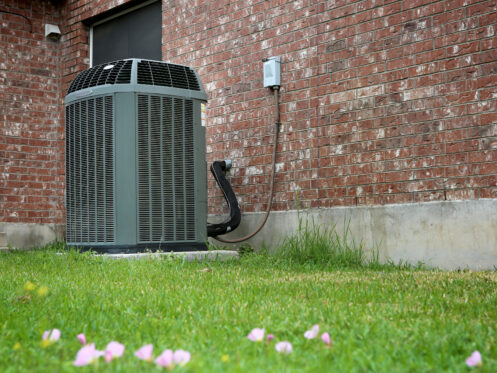Tropical climates tend to wreak havoc on home HVAC systems due to their hot and humid environment. As a homeowner, it’s important to be diligent about preventing common issues with your HVAC system, like mold growth. Fortunately, we’re going to share our best tips for extending the overall lifespan of your HVAC system if you happen to live in a tropical climate.
Maintenance Service Is an Absolute Must
By far, one of the best ways to extend the overall lifespan of your HVAC system is to have it receive regular maintenance service. Your air conditioning system should receive professional service in the spring and your heating system should get the same service in the fall. This service will take care of things like lubricating moving parts, checking electrical connections, and calibrating your thermostat to ensure that your system is working as efficiently as possible.
Invest in a Whole-Home Dehumidifier
Tropical climates tend to be extremely humid in nature. It’s important to realize that air conditioning systems do remove some excess humidity from the air as they operate. However, typical HVAC systems are not meant to handle a very high level of humidity. In fact, you’ll likely find yourself constantly turning the thermostat temperature down to help compensate for the overly stuffy way you feel.
Humidity can wreak havoc on the body, making it feel much hotter than the temperature actually is. Unfortunately, if you’re consistently turning down your thermostat, you’re going to be overworking your air conditioning system. You can prevent this issue by investing in a whole-home dehumidifier.
These units work in unison with your air conditioning system to remove humidity from your home to make it more comfortable. When your dehumidifier is dealing with the majority of the work to lower the relative humidity level in your home, you can enjoy running your cooling system less often. You may even find that you can turn the temperature setting up because you’re more comfortable due to the decreased humidity.
Keep Up With Filter Changes
One of the most common ways to shorten the lifespan of your HVAC system is not to change air filters regularly. Whenever your HVAC filter gets dirty, it becomes much harder for your blower to circulate air throughout your ductwork. This will cause your air conditioning system to run excessively as it’s unable to operate efficiently with a dirty filter.
Instead, you should make it a habit to check your air filter every month. Hold it up to a light and look through it. If you can’t see through it any longer, it’s time for a change. When selecting a filter for your HVAC system, it’s important to ensure you’re getting one with an adequate filtering capability. Each filter is given a MERV rating, which determines how effective it is at removing airborne particles.
It’s recommended that most homeowners invest in a filter with a MERV rating between 8 and 10. This helps to offer optimal filtering capabilities alongside affordability. When you invest in a quality air filter, it prevents unwanted airborne contaminants from entering the internal components of your HVAC system and causing premature wear and tear on its components.
Consider UV Sanitizing Lights
Another great method for reducing the amount of airborne containment that makes it inside your HVAC system is to invest in a UV sanitizing light. These lights damage the nucleic acid inside airborne pathogens and render them unable to reproduce. When you have UV sanitizing lights installed over the evaporator coil for your HVAC system, they will help to prevent unwanted mold and mildew growth.
Keep Vents Clean and Clear
Just as leaving a dirty filter in your HVAC system can lead to your system overworking, so can dirty and obstructed vents. If you rely on a central air conditioning system, you’re going to have supply and return vents throughout each room of your home. It’s imperative to regularly clean off your vents to ensure that there’s no blockage of air coming in or out of them. Additionally, you want to ensure there are no objects within a 3-foot radius of the vent, such as furniture. Clean and clear vents allow for optimal system airflow and prevent premature wear and tear on HVAC system components.
Consider Using Curtains
One of the biggest efficiency killers for cooling systems is natural sunlight. When direct sunlight is able to come into a particular room, it can heat up that room’s temperature by up to 10 degrees. This can leave your HVAC system struggling to keep up with your cooling demands. When you invest in blinds or curtains to block out the sunlight, your HVAC system can run less often while keeping your home at a comfortable temperature.
Keep Your Condenser Unit Free of Debris
The outdoor condenser unit is an imperative part of your HVAC system that’s responsible for releasing hot air. If your condenser unit has debris or other objects pushed up against it, its ability to disperse that hot air is going to be greatly diminished. An inefficient HVAC system is going to have to run longer to compensate for this issue. For this reason, it’s best to regularly check your outdoor condenser unit to ensure that there’s no debris against it or any low-hanging branches or shrubbery near it.
Seal Leaky Ductwork
If your HVAC system relies on ductwork to deliver treated air throughout your home, then you’ll need to regularly invest in duct sealing service. The EPA has estimated that homeowners can lose up to 30% of their treated air through leaks in their ductwork. Every bit of treated air that you lose means that your HVAC system has to work even harder to compensate for that loss. Experts recommend having your ductwork sealed every three to five years.
Invest in Adequate Insulation
Home insulation is going to have a tremendous impact on how effective your HVAC system is going to be throughout the year. If your home lacks adequate insulation, hot humid air can seep into your home and cause your air conditioning system to constantly run. It’s always a good idea to invest in insulation that either meets or exceeds the recommended R-value for your area. The higher the R-value, the more effective the insulation is at resisting temperature and humidity changes.
Supplement With Ceiling Fans
It’s no surprise that the less often you run your HVAC system, the longer it’s going to last you. One of the best ways to help reduce the amount of time that you run your HVAC system is to supplement with ceiling fans. These fans will help to move air in particular directions to make your home environment more comfortable. In the summertime, you’ll want to have your fan spinning in a counterclockwise direction. This will force air down onto you and naturally chill your body. In the wintertime, you’ll want to switch the direction to spin clockwise. This will help to circulate hot air from the top of the room back down to the floor.
Trustworthy HVAC Service
Ahoy! Cooling & Heating offers trustworthy HVAC services to residents throughout the entire Tampa, FL community. Our technicians can easily assist with all your heating, air conditioning, ductless mini-split, zone system, commercial, indoor air quality, and thermostat installation needs. Simply contact us today to schedule your next service appointment.

